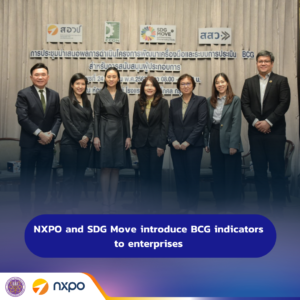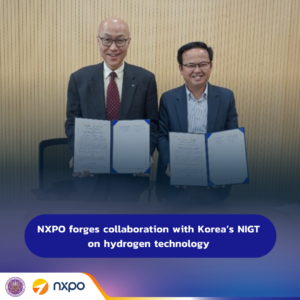NXPO Executive Board Meeting was held on 26 June 2023 with Prof. Dr. Anek Laothamatas, Minister of Higher Education, Science, Research and Innovation, serving as the chairman. The meeting agenda centered around policy measures to support the future industry and the battery industry.

In his remarks, Prof. Anek informed the meeting of his recent mission to Japan to forge Thailand-Japan STI collaboration. While in Japan, he paid a visit to Kubota Corporation to learn about their futuristic agriculture program, in which tools and equipment are employed to reduce labor input and to collect and utilize data (soil quality, water, yield, etc.) for precision farming. Recognizing the benefits of this production system, Minister Anek assigned the Program Management Unit for Area-Based Development (PMU-A) and NXPO to drive precision farming in Thailand.

“Thai firms are now aware of the work of our ministry and interested to explore STI potential to grow their businesses. Organizations like NXPO, the National Science and Technology Development Agency (NSTDA) and all program management units can help these companies achieve sustainable growth with STI by offering supporting schemes such as matching fund. As the world is paying more attention to the environmental cause and sustainable production, the concept of circular economy and circular business should also be integrated into our agricultural production systems,” said Minister Anek

NXPO President Dr. Kitipong Promwong presented the impact of the future food industry on the Thai economy. The future food industry is driven by global trends such as demands for safe and healthy foods, sustainable production and consumption, and changes in behavior and lifestyle. Future food products are diverse, covering vast areas of functional food and ingredients, novel foods such as plant-based & insect proteins and lab-grown meat, organic food, and medical & personalized food. These food products are increasingly dominating the food market, and their export value is growing exponentially. Therefore, NXPO is ramping up its effort to promote this industry as it represents a new economic engine to drive both the farming and manufacturing sectors.

As for the battery industry, Dr. Kitipong reported that the battery industry in Thailand consists of producers of both battery cells and battery packs. Though the battery cell has higher market demands, its production requires high investment and poses high risk. From the strategic viewpoint, Thailand should import battery cells from China and focus on battery assembly to support various downstream industries and software design to make battery packs compatible to the requirements of each product. Although the battery pack assembly makes less money, the fact that it can support many other industries pushes it to a high impact sector.
To promote the battery industry, NXPO proposed to classify the battery industry as a new s-curve industry and expand its utilization and application scope to include 7 major industries. Such classification will help roll out other policy measures such as import tax reduction on battery cells to boost battery assembly activities, support for building battery assembly plants in Thailand, and support to establish a battery technology center to foster international collaboration on battery technology and service and provide knowledge and technology transfer to Thai industry. Meanwhile, NXPO is currently working on workforce development program to supply skilled workers to the battery industry.






